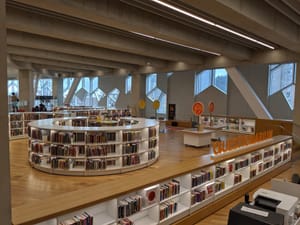One of the more interesting discussions I had at ALA was with Martha Whittaker of Serials Solutions. She was talking about their use of the expression ERAMS (Electronic Resource Access and Management Services). Here is some blurb from Serials Solutions leaflet describing ERAMS:
Now that the nature of library collections has changed and the majority of new acquisitions are electronic, E-Resource Access and Management Services (ERAMS) have emerged as a rapidly evolving category of library services for making electronic collections accessible and useful. By helping optimize the usage of e-resources, ERAMS help libraries achieve their goals of connecting people to nformation and being the best partner for research in the digital age.
They go on to enumerate four processes as central to ERAMS (I don’t entirely follow the Serials Solutions text here):
- Collect: a comprehensive knowledgebase. You have to characterize the resources which are available in various ways.
- Correct. The knowledgebase has to be accurate, current, normalized. My colleague Eric Hellman, of OCLC Openly, talks about ‘rivers’ and ‘lakes’ of bibliographic data. In the cataloging world we are used to lakes: accumulating data about resources, where neither the resource nor the data change very much over time (although this is changing). In the ERAMS world, we are getting used to rivers, multiple flows of data which change as terms, packages, publishers, and so on, change. (You can never step in the same knowledgebase twice, as Heraclitus might have said.)
- Connect. Connect readers to resources effectively.
- Control. “Optimize staff and budget resources with management tools that streamline worlflows and enable librarians to acquire the best content for their library”.
ERAMS is an attempt to name a category. What is the category? It is about managing published e-resources with a particular focus on the supporting knowledgebase. In the way it is presented here, ERAMS seems to include metasearch, knowledgebase, ERM, resolution, A-Z lists, and related reporting and management tools. Putting to one side whether this is a category that illuminates, why would one want a new category? Well, Serials Solutions needs people to understand the value of their offer, and in the absence of a category like this, that may be more difficult. It would certainly also be useful for libraries. Libraries currently work with a set of categories heavily influenced by, and encapsulated in, ILS modules and this may distort planning.
Of course, the ILS vendors are offering ERAMS solutions also, which integrate in various ways with existing ILS products and emerging discovery tools. And that integration has value. The Serials Solutions brochure notes that “clarity and focus on e-resources is essential to participating in this product category. Investments in other directions distract from the core mission.” One could imagine some argument with that statement and a counter statement to the effect that libraries should not silo access and management support capacity.
This all relates to more general discussion about service frameworks, the attempt to work towards a shared understanding of which service categories are important and how to name them. As we move forward we have several areas where one has to define terms in order to have a conversation: there is not a readymade handle which carries around a well-understood set of things. Think about repository, archive, storage, and preservation. And I have spoken about how I think disclosure is an interesting new category in these pages before.
Serials Solutions have done us a favor by prompting a discussion. And this is whether or not ERAMS sticks as a name, and whether or not one wants to circumscribe this particular set of activities in this way. Thoughts?



